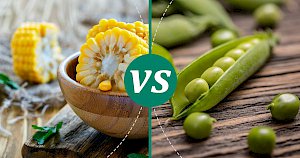Peas vs Corn: Calories & Nutrition Showdown


Peas vs Corn
Nutrition Facts
Serving size:
change
5g10g15g20g30g40g50g60g80g100g120g140g160g180g200g220g250g300g350g400g450g500g600g700g800g900g1000g
1oz2oz3oz4oz5oz6oz7oz8oz10oz12oz15oz20oz25oz30oz35oz40oz50oz
Amount Per Serving:
Serving size:
change
5g10g15g20g30g40g50g60g80g100g120g140g160g180g200g220g250g300g350g400g450g500g600g700g800g900g1000g
1oz2oz3oz4oz5oz6oz7oz8oz10oz12oz15oz20oz25oz30oz35oz40oz50oz
Amount Per Serving:
Peas vs Corn 100g Compare
| per 100g | Peas | Corn |
|---|---|---|
| Calories | 81 | 86 |
| Carbohydrates | 14.45 g | 14.69 g |
| Fat | 0.4 g | 1.63 g |
| Saturated fat | 0.07 g | 0.3 g |
| Dietary fiber | 5.7 g | 2.43 g |
| Protein | 5.42 g | 2.79 g |
| Water | 78.86 g | 80.25 g |
| Calcium | 25 mg | 0.656 mg |
| Iron | 1.47 mg | 0.388 mg |
| Magnessium | 33 mg | 25.76 mg |
| Potassium | 244 mg | 237 mg |
| Vitaminium A | 765 µg | 187 µg |
| Vitaminium B1 (Thiamine) | 0.266 mg | 0.079 mg |
| Vitaminium B2 (riboflavin) | 0.132 mg | 0.138 mg |
| Vitaminium B3 (Niacin) | 2.09 mg | 1.593 mg |
| Vitaminium B5 | 0.104 mg | 0.717 mg |
| Vitaminium B6 | 0.169 mg | 0.15 mg |
| Vitaminium B9 (Folic acid) | 0.065 mg | 42 mg |
| Vitaminium C | 40 mg | 6.8 mg |
| Vitaminium E | 0.13 mg | 0.07 mg |
| Vitaminium K | 0.025 µg | 0.3 µg |
| Beta karoten | 449 mg | 16 mg |
Discover the Nutritional Gems: Peas and Corn
When it comes to the vegetable aisle, peas and corn are like the unsung heroes of the nutritional world. Both pack a punch in terms of health benefits and culinary versatility. From the fresh sweetness of green peas to the juicy crunch of corn kernels, these vegetables have more in common than just their popularity as side dishes. But when you place them side by side, which one emerges as the nutritional champion?
A Closer Look at Peas and Corn
Before diving into the nutritional nitty-gritty, let's appreciate some interesting facts about these two vegetables. Peas have been a staple in diets for thousands of years, with evidence of cultivation dating back to the Bronze Age. They are not only a source of good nutrition but also fix nitrogen in the soil, making them beneficial for the environment.
Corn, on the other hand, has been equally significant throughout history. Originating in Mexico over 9,000 years ago, corn has become a global food staple, integral to cuisines around the world. Its cultivation has evolved dramatically, with varieties ranging from sweet corn to popcorn, each with its unique taste and texture.
Nutritional Face-Off: Peas vs. Corn
When it comes to nutritional content, both peas and corn bring their A-game, but they have their differences. Let's break it down:
- Calories: Peas contain slightly fewer calories than corn, making them a marginally better option for calorie-conscious individuals.
- Carbohydrates and Fiber: Peas have a lower carbohydrate content but are higher in fiber, which is beneficial for digestion and maintaining a feeling of fullness.
- Protein: Peas are a stronger source of protein, which is crucial for muscle repair and growth.
- Vitamins and Minerals: Peas generally outshine corn in terms of vitamins and minerals, boasting higher levels of iron, calcium, and vitamins A, C, and K, which are vital for various bodily functions including vision, immune system, and blood clotting.
However, corn is not without its merits. It provides more potassium and magnesium, which are essential for heart health and muscle function, respectively. Corn also has its own set of antioxidants and phytonutrients, including beta-carotene, albeit in smaller amounts compared to peas.
So, Which Is Better?
Ultimately, the choice between peas and corn comes down to personal preference and nutritional needs. For those looking to increase their protein and fiber intake, peas might be the better option. On the other hand, if you're focusing on potassium and enjoy a sweeter taste, corn could be your go-to vegetable.
Both vegetables are incredibly versatile and can be included in a variety of dishes, from soups and salads to casseroles and stir-fries. Incorporating a mix of both peas and corn into your diet can provide a broad spectrum of nutrients and flavors, making your meals not only healthier but also more enjoyable.
In conclusion, whether you lean towards peas or corn, you're making a nutritious choice. By understanding the unique benefits of each, you can tailor your diet to better meet your nutritional goals, ensuring a balanced and tasty approach to health.
Peas 100g
81kcalCalories source
- 70% CARBS.
- 26% PROTEIN
- 4% FAT
Corn 100g
86kcalCalories source
- 69% CARBS
- 13% PROTEIN
- 17% FAT
100g | ounce | single piece | tablespoon | teaspoon | cup | half cup | small can | medium can
Compares of peas
- Peas vs Artichoke
- Peas vs Asparagus
- Peas vs Beetroot
- Peas vs Pepper
- Peas vs Broccoli
- Peas vs Brussels Sprouts
- see all compares of peas
Marcin Piotrowicz
calories-info.com creator
Healthy diet and healthy lifestyle promoter
Add comment